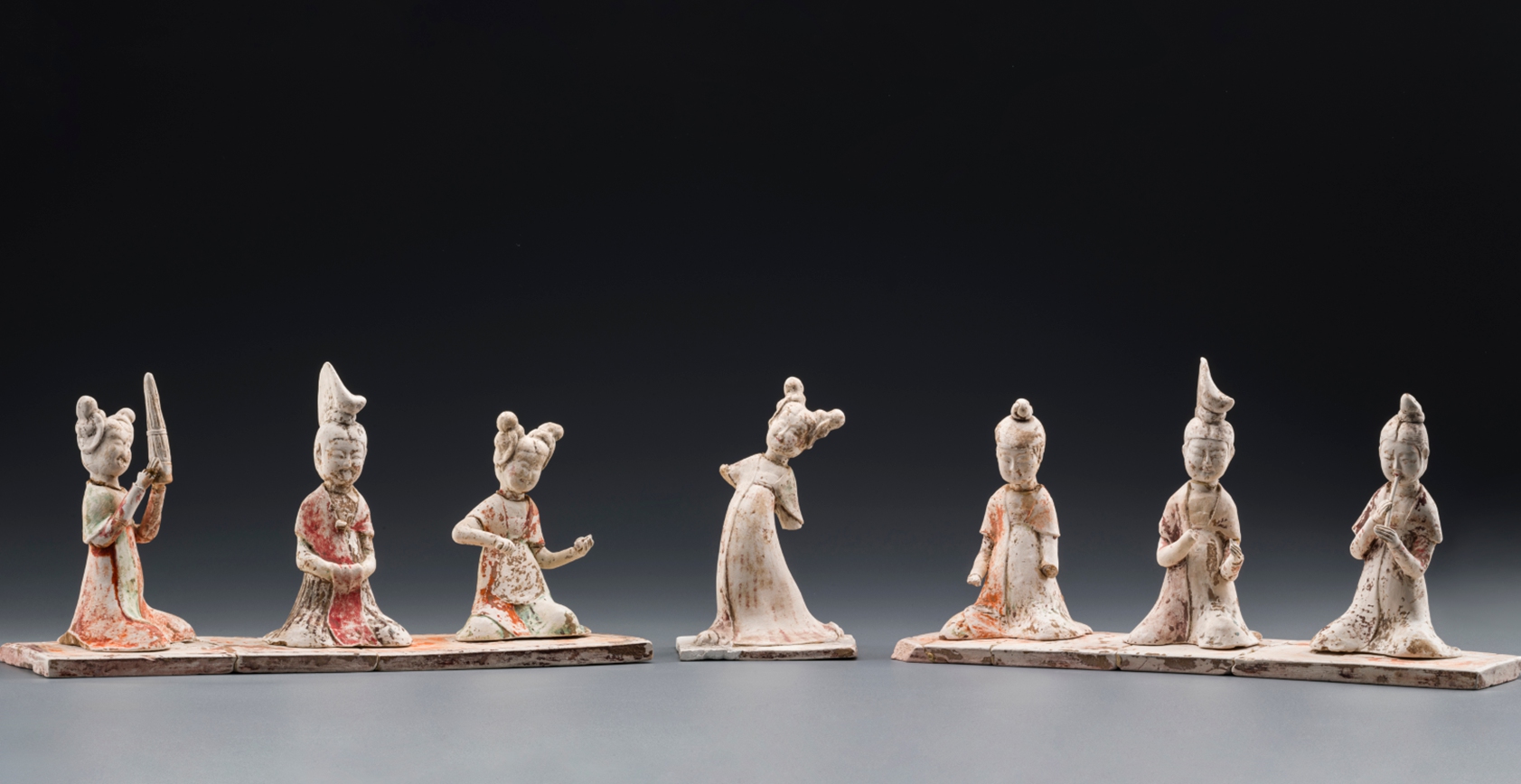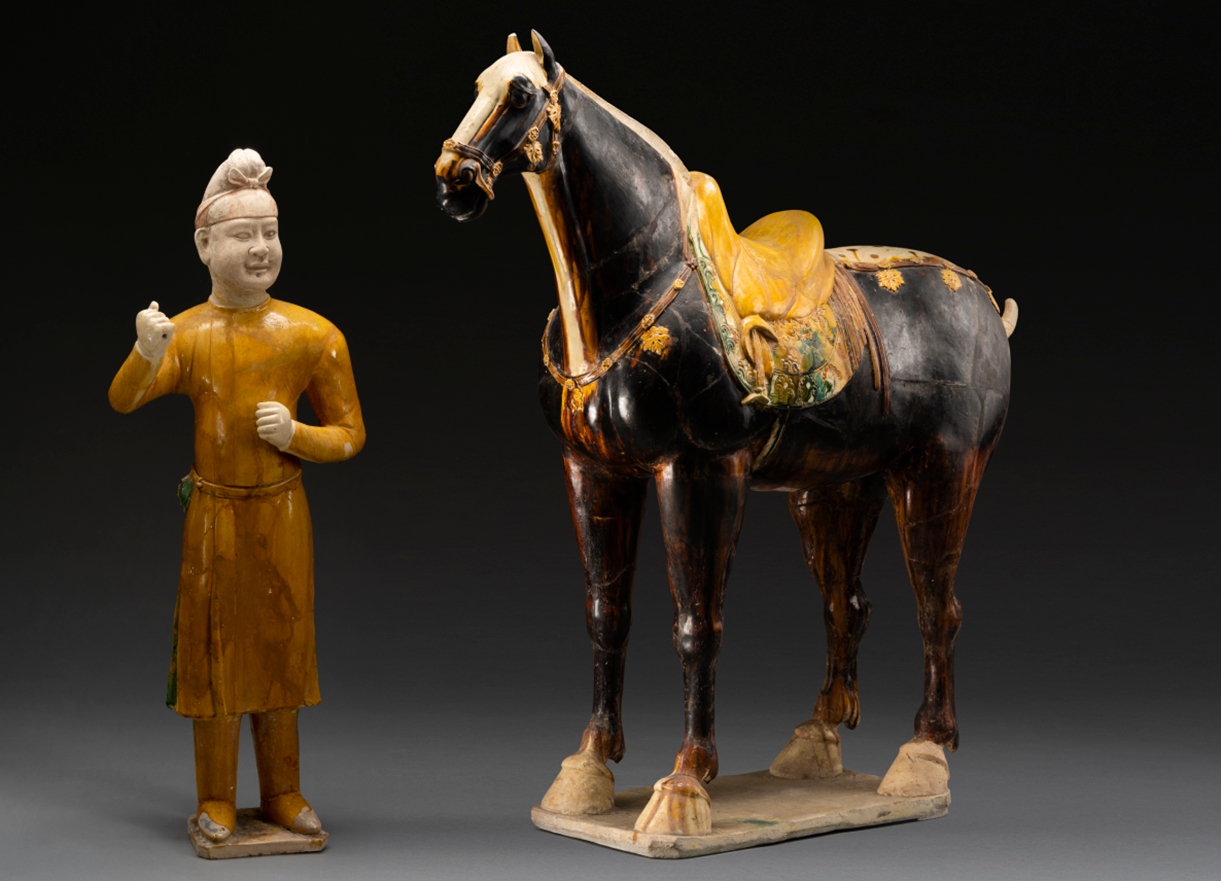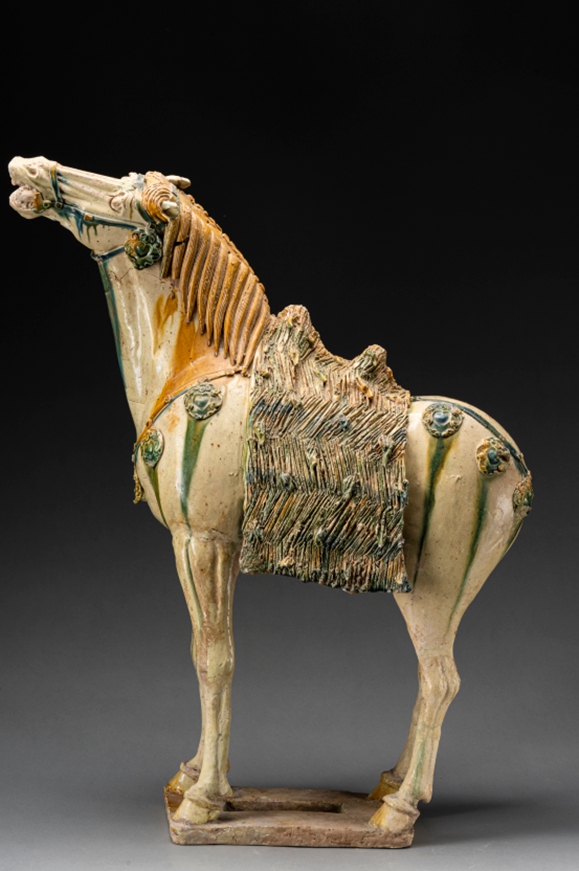
A set of polychrome female musician and dancer figurines from the Tang Dynasty (618-907) Photo: Courtesy of the Henan Provincial Institute of Cultural Heritage and Archaeology
Chinese President Xi Jinping and French President Emmanuel Macron have respectively prefaced an exhibition titled "Tang China - A Cosmopolitan Dynasty (7th-10th Century)," which was inaugurated Monday at France's Guimet National Museum of Asian Arts.
Noting that this year marks the 60th anniversary of the establishment of diplomatic ties between China and France, Xi said the two countries reached an agreement to hold an exhibition of Tang Dynasty (618-907) artifacts at the Guimet Museum during his visit to France in May.
Xi called for seeking inspiration from history and culture so as to deepen people-to-people exchanges and mutual learning, and enhance cooperation in cultural heritage protection. Should each treasure what of its own is beautiful, what is different but beautiful can be shared, he said, calling for integrating historical sentiments and contemporary spirits into Chinese-French friendship and working for a more solid and vibrant China-France comprehensive strategic partnership.
For his part, Macron said that to celebrate the 60th anniversary of bilateral diplomatic relations, and the Year of Culture and Tourism, the Guimet Museum will hold a grand exhibition of Tang Dynasty artifacts.
This historically significant exhibition once again highlights the dynamic cultural exchanges between France and China, which will continue to play an important role in growing bilateral relations, he said.
The exhibition, directed by China's National Cultural Heritage Administration and the French Ministry of Culture, showcases over 200 pieces or sets of exquisite artifacts from 32 cultural and museum institutions in 10 provincial-level regions and cities in China.
Tan Ping, director of Art Exhibitions China, one of the organizers, told the Global Times on Tuesday that the team has selected cultural relics that best reflect the diverse and open characteristics of the Tang Dynasty.
"All these items reflect part of the prosperous Tang Dynasty. By putting them together, visitors in France will see a vivid retrospective of life in Tang society," Tan said.

A tri-colored figurine featuring a man leading a horse Photo: Courtesy of the Shaanxi Academy of Archaeology
A diverse display of artifactsA highlight of the celebrations marking the 60th anniversary of diplomatic relations between France and China, and the China-France Year of Culture and Tourism, the exhibition presents masterpieces to the French public for the first time, including the three most important Tang goldsmith's treasures, remarkable wall paintings, works from recent archaeological discoveries, and rare scrolls of paintings and calligraphy, Yannick Lintz, president of the Guimet National Museum of Asian Arts, told the Global Times on Tuesday via email.
The exhibition is a vibrant display of the Tang Dynasty's cultural prowess, divided into five thematic sections, such as living in Chang'an (the capital of the Tang Dynasty), embracing the world, and the Silk Road of the Tang Dynasty. These sections bring to life the grandeur of the Tang era through diverse artifacts, according to a document that the Shaanxi Academy of Archaeology sent to the Global Times on Tuesday.
Zhong Jianrong, head of the Shaanxi Academy of Archaeology, told the Global Times that the institute has contributed 29 pieces of cultural relics to the exhibition, such as colored and painted pottery figurines, and hunting scene murals. "These artifacts epitomize the Tang Dynasty's open, inclusive, and diverse civilization, offering a cultural and aesthetic feast to the French audience," he said.
He noted that Xi'an was not only the political, economic, and cultural hub of China but also the starting point of the Silk Road and a metropolis that attracted different people from afar. The exhibition, commemorating the 60th anniversary of China-France diplomatic relations, is a testament to the enduring friendship and cultural exchanges between the two nations.
Liu Haiwang, head of the Henan Provincial Institute of Cultural Heritage and Archaeology, noted to the Global Times that the institute has contributed a set of painted female music and dance figurines to the exhibition, which vividly captures the elegance and liveliness of the Tang Dynasty's social and cultural prosperity.

A piece of tri-colored horse statue Photo: Courtesy of the Shaanxi Academy of Archaeology
Contribution to cultural dialogueExperts from both China and France have lauded the exhibition for its significant contribution to the cultural dialogue and mutual understanding between the two countries.
Li Xiaocong, a professor at the Department of History in Peking University, told the Global Times on Tuesday that the cultural characteristics of the Tang Dynasty are mainly reflected in its openness, diversity, and inclusiveness. During the Tang Dynasty, China had frequent exchanges with neighboring countries and regions, absorbing various foreign cultural elements and forming a unique cultural landscape.
Hou Ningbin, curator of the Shaanxi History Museum, told the Global Times that China and France are outstanding representatives of two ancient and unique civilizations in the East and the West. Both countries have attached great importance to each other in the protection and inheritance of cultural heritage, and have a long history of exchanges.
He believes that "the successful holding of this exhibition and related activities will have epoch-making significance for the French and European people to better understand the glorious, confident, and open Tang Dynasty."
This exhibition will enable the French public to discover more about Chinese history, and that of the Tang Dynasty, through the discovery of its capital Chang'an, a majestic city at the crossroads of the Silk Roads, Lintz also echoed.






